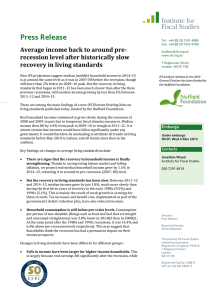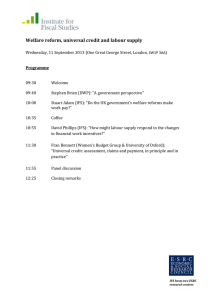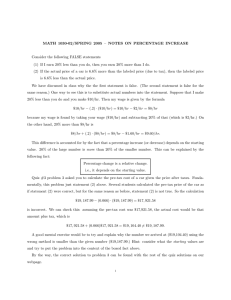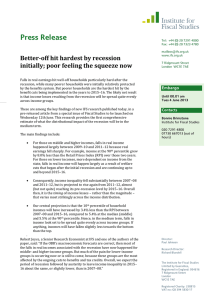IFS PRESS RELEASE
advertisement
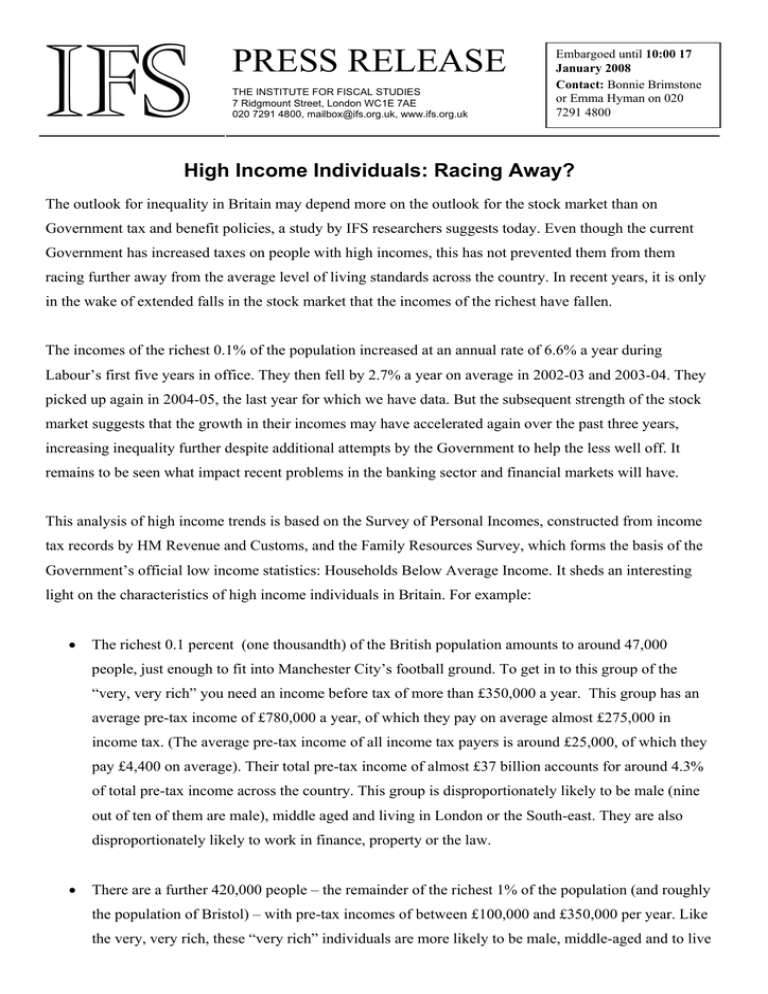
IFS PRESS RELEASE THE INSTITUTE FOR FISCAL STUDIES 7 Ridgmount Street, London WC1E 7AE 020 7291 4800, mailbox@ifs.org.uk, www.ifs.org.uk Embargoed until 10:00 17 January 2008 Contact: Bonnie Brimstone or Emma Hyman on 020 7291 4800 High Income Individuals: Racing Away? The outlook for inequality in Britain may depend more on the outlook for the stock market than on Government tax and benefit policies, a study by IFS researchers suggests today. Even though the current Government has increased taxes on people with high incomes, this has not prevented them from them racing further away from the average level of living standards across the country. In recent years, it is only in the wake of extended falls in the stock market that the incomes of the richest have fallen. The incomes of the richest 0.1% of the population increased at an annual rate of 6.6% a year during Labour’s first five years in office. They then fell by 2.7% a year on average in 2002-03 and 2003-04. They picked up again in 2004-05, the last year for which we have data. But the subsequent strength of the stock market suggests that the growth in their incomes may have accelerated again over the past three years, increasing inequality further despite additional attempts by the Government to help the less well off. It remains to be seen what impact recent problems in the banking sector and financial markets will have. This analysis of high income trends is based on the Survey of Personal Incomes, constructed from income tax records by HM Revenue and Customs, and the Family Resources Survey, which forms the basis of the Government’s official low income statistics: Households Below Average Income. It sheds an interesting light on the characteristics of high income individuals in Britain. For example: • The richest 0.1 percent (one thousandth) of the British population amounts to around 47,000 people, just enough to fit into Manchester City’s football ground. To get in to this group of the “very, very rich” you need an income before tax of more than £350,000 a year. This group has an average pre-tax income of £780,000 a year, of which they pay on average almost £275,000 in income tax. (The average pre-tax income of all income tax payers is around £25,000, of which they pay £4,400 on average). Their total pre-tax income of almost £37 billion accounts for around 4.3% of total pre-tax income across the country. This group is disproportionately likely to be male (nine out of ten of them are male), middle aged and living in London or the South-east. They are also disproportionately likely to work in finance, property or the law. • There are a further 420,000 people – the remainder of the richest 1% of the population (and roughly the population of Bristol) – with pre-tax incomes of between £100,000 and £350,000 per year. Like the very, very rich, these “very rich” individuals are more likely to be male, middle-aged and to live in London and the South-east. They also work disproportionately in the same industries, although interestingly 15% of this group are in “health and social work” (presumably doctors and senior health service managers who have enjoyed relatively big pay increases under Labour). ENDS Notes to editors: 1. Figures relate to 2004/05 unless otherwise stated and are presented in today’s prices, i.e. 2007/08 prices. 2. The richest 0.1% of adults in Great Britain consists of 47,000 adults with annual pre-tax incomes above £350,000. The richest 1% of adults in Great Britain (excluding the top 0.1% of adults) consists of 420,000 adults with annual pre-tax incomes between £100,000 and £350,000. Together these two groups form the richest 1% of adults (about 470,000 adults in total) who all have annual pre-tax incomes above £100,000. 3. Further analysis will be available in Racing Away? Income Inequality and the Evolution of High Incomes by Mike Brewer, Luke Sibieta and Liam Wren-Lewis. This work was jointly funded by the Nuffield Foundation and the ESRC-funded Centre for the Microeconomic Analysis of Public Policy at IFS. 4. This report will be launched at IFS on Thursday 17th January 2008. The briefing will start at 10am and is expected to conclude by 11.15am. If you would like to attend, please contact Bonnie Brimstone (020 7291 4800 or bonnie_b@ifs.org.uk).
